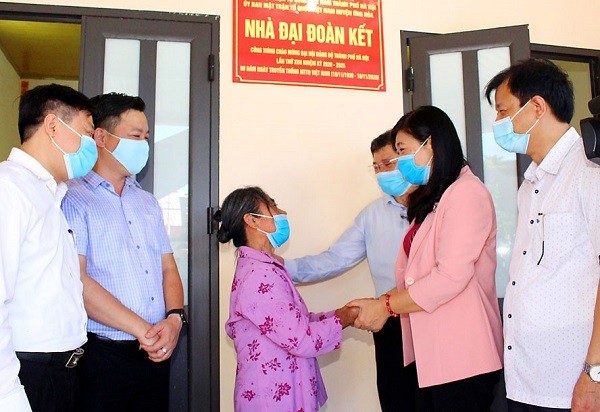(VOVWORLD) - The Vietnamese Party and State consider sustainable poverty reduction a consistently important priority of national renewal, construction, and development. It’s an important part of the socialist orientation of Vietnam to ensure human rights and the social security rights of citizens as stipulated in Article 34 of Vietnam’s 2013 Constitution.
 Chairwoman of the Vietnam Fatherland Front's Hanoi affiliate presents a compassion house to Ms Du Thi Phuc in Ung Hoa district (photo: hanoimoi.com.vn) Chairwoman of the Vietnam Fatherland Front's Hanoi affiliate presents a compassion house to Ms Du Thi Phuc in Ung Hoa district (photo: hanoimoi.com.vn) |
Vietnam obtained remarkable achievements in poverty reduction during the past five years. Vietnam mobilized 5.3 billion USD for its national poverty reduction program during this period, and the poverty rate fell from 9.88% in 2015 to 2.75% in 2020.
The government has adopted coordinated and comprehensive programs, mechanisms, and policies to reduce poverty, with priority given to ethnic minority people and other vulnerable people living in disadvantaged areas.
Vietnam was one of the first 30 countries in the world to adopt a multidimensional approach to poverty reduction, an approach that combines sustainable growth with ensuring a minimum living standard for its people.
In the next five years, this approach will work to raise household incomes and access to social services for the poor. These social services include information, jobs, healthcare, education, basic accommodation, clean water, a clean environment, and better hygiene. Vietnam has revised its poverty reduction indexes for nutrition, education, and jobs.
By improving its policies on poverty reduction and social security, Vietnam has improved social services available to poor families. Vietnam has defined the poverty line for the 2021-2025 period as an annual per capita income of 66 USD in rural areas and 88 USD in urban areas. The government has asked cities and provinces to review and categorize poor households in order to design better poverty reduction policies, programs, and solutions.
The National Assembly and the Government have allocated sufficient resources to multiple poverty reduction programs, including preferential credit programs, vocational training programs, and programs to send poor and ethnic minority workers overseas, as well as preferential policies on health care, education, accommodation, water, electricity, and legal assistance for the poor.
The National Assembly has approved more funding for the National Target Program on Sustainable Poverty Reduction until 2025 to reduce poverty in a multi-dimensional, inclusive, and sustainable manner; prevent poverty relapse; help the poor reach the minimum living standard, access basic social services, and improve their living conditions, and deliver more support to poor, disadvantaged districts and communes.
The program is focused on investing in infrastructure in disadvantaged regions, improving the income and living standard of the poor, providing vocational training, generating jobs, and helping vulnerable people avoid poverty.
By ensuring the rights of the poor, Vietnam is determined not to sacrifice social progress and equality for economic growth. Vietnam believes investment in poverty reduction is an investment in development that will help the poor to escape poverty, build a prosperous life, and achieve sustainable development goals and sustainable growth. Vietnam intends to achieve its poverty reduction goal by increasing income and access to social services for the poor.
Vietnam is reforming its poverty reduction program, inspiring people to strive for a better life, and mobilizing the whole political system to engage in poverty reduction to soon fulfill its commitment to the international community to achieve sustainable development and poverty reduction by 2030.